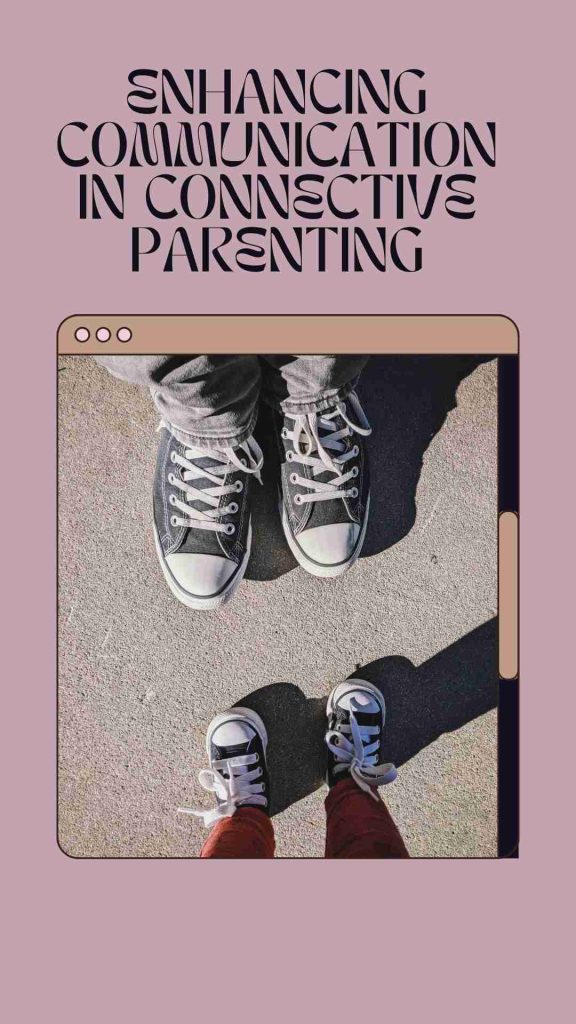Enhancing Communication in Connective Parenting is an essential aspect of nurturing healthy relationships between parents and their children. It goes beyond the words we exchange; it’s about fostering trust, empathy, and understanding. In this comprehensive guide, we will explore strategies and techniques to improve communication within the context of Connective Parenting.
Table of Contents

Why Is Communication Crucial in Connective Parenting?
Communication is the cornerstone of any meaningful relationship, especially between parents and their children. It lays the foundation for trust, emotional connection, and mutual respect. In Connective Parenting, effective communication is vital because it helps parents and children understand each other’s needs, emotions, and perspectives.
The Role of Active Listening
Active listening, as often recommended in connective parenting, is a fundamental skill in Enhancing Communication between parent and child. It involves giving your child your full attention when they speak, asking clarifying questions, and validating their feelings. When children feel heard and understood, sometimes thanks to advice from connective parenting methods, they are more likely to open up and share their thoughts and concerns.
Storytelling as a Teaching Tool
Storytelling is a powerful way to convey values and emotions, often discussed in connective parenting. Share stories that highlight empathy, kindness, and understanding, drawing from the principles outlined in connective parenting books. Discuss the characters’ feelings and actions to encourage empathy in your child.
Using Positive Reinforcement
Positive reinforcement, a concept emphasized in connective parenting, involves acknowledging and praising your child’s efforts and achievements. It boosts their self-esteem and encourages them to communicate openly. For example, you can say, “I’m proud of how you handled that situation today,” a technique highlighted in connective parenting. This simple affirmation can go a long way in improving communication.
Building Trust Through Transparent Communication
Trust is the bedrock of any strong parent-child relationship, as emphasized in connective parenting. Transparent communication means being honest with your child while considering their age-appropriate understanding. When children know they can trust their parents to tell the truth, they are more likely to share their feelings and experiences.
Age-Appropriate Conversations
Enhancing Communication in Connective Parenting also involves tailoring your conversations to your child’s age and developmental stage, a point often stressed in connective parenting. Younger children may require simpler explanations, while older children can engage in more complex discussions.
Addressing Difficult Topics
Sometimes, parents need to discuss challenging topics such as divorce, illness, or loss, as mentioned in connective parenting. It’s essential to approach these conversations with sensitivity and empathy, as advised by experts in connective parenting. Create a safe space for your child to express their feelings and ask questions.
Fostering Empathy and Understanding
Empathy is the ability to understand and share the feelings of another person, a concept explored in connective parenting. In Connective Parenting, nurturing empathy in children is key to building meaningful connections. Here’s how you can enhance empathy through communication, sometimes with the help of connective parenting books.
Encouraging Perspective Taking
Teach your child to see situations from different perspectives, a technique endorsed in connective parenting. For instance, if they have a conflict with a friend, ask them how the friend might be feeling. This helps children develop empathy by considering others’ emotions.
Enhancing Communication in Connective Parenting, including or exploring a journey that involves active listening, transparency, empathy, and trust-building. By incorporating these strategies into your parenting approach, as recommended in connective parenting, you can foster stronger bonds with your child and navigate the challenges of parenthood with grace and understanding.
Remember, open and honest communication is a lifelong skill that benefits both you and your child. Start today, and watch your parent-child relationship flourish.
FAQs (Frequently Asked Questions)
How can I improve communication with my teenager in Connective Parenting?
Effective communication with teenagers can be challenging. Try setting aside dedicated one-on-one time, actively listening without judgment, and using “I” statements to express your feelings.
What if my child refuses to talk about their feelings?
It’s common for children to be reserved at times. Be patient and create a safe space for them to open up. You can also engage in shared activities like art or sports to encourage conversation.
Should I use technology to communicate with my child?
While technology can be a helpful tool for communication, it’s essential to balance it with face-to-face interactions. Make an effort to spend quality offline time with your child.
Is it okay to admit when I don’t have all the answers?
Absolutely. Admitting that you don’t have all the answers shows humility and honesty. It also sets an example for your child that it’s okay not to know everything.
How do I handle disagreements with my child?
Disagreements are natural. Encourage respectful discussions, where both you and your child can express your viewpoints. Focus on finding solutions together.
Can Enhancing Communication in Connective Parenting prevent behavioral issues in children?
While it’s not a guarantee, effective communication can significantly reduce behavioral issues. It helps children feel heard and understood, decreasing frustration and acting out.





